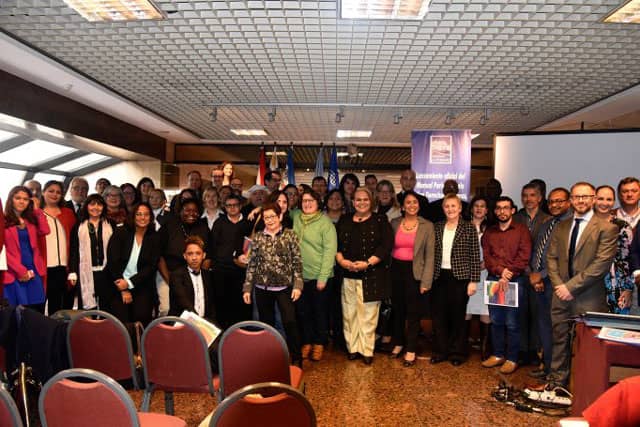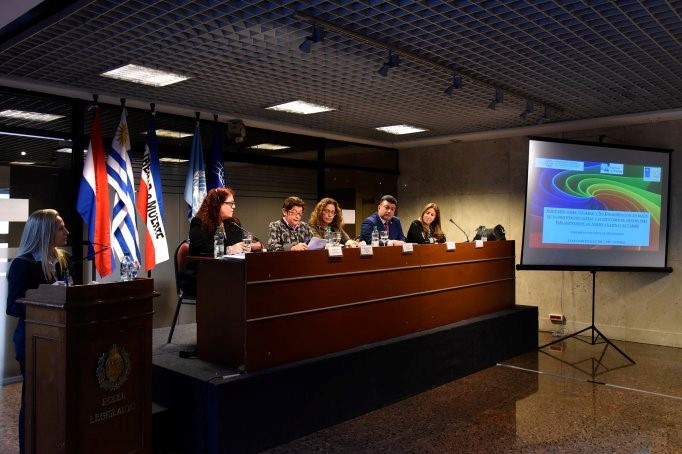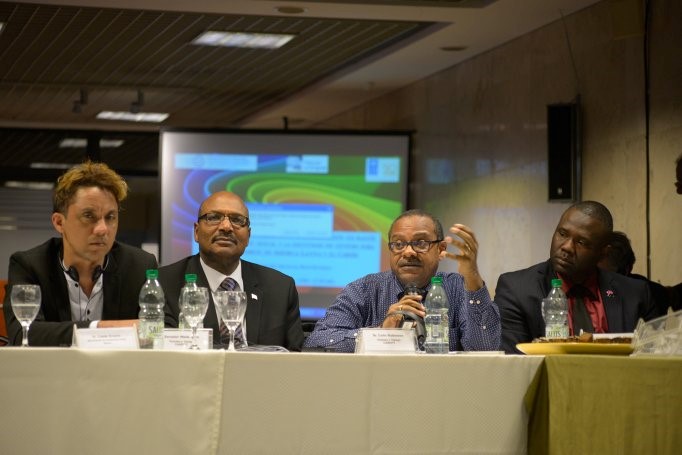
Montevideo/The Hague/New York. – Parliamentarians from Aruba, Bolivia, Belize, Costa Rica, Dominican Republic, Suriname, Trinidad and Tobago and Uruguay participated in PGA’s Seminar on Equality and Non-Discrimination based on Sexual Orientation and Gender Identity for Parliamentarians of Latin America and the Caribbean hosted by the Parliament of Uruguay, in Montevideo on Monday, July 11 2016.
The objectives of the Seminar were to:
-
Present a revised draft of Advancing the Rights and Inclusion of LGBTI people: A Handbook for Parliamentarians, prepared by PGA and the United Nations Development Program (UNDP), a tool with key information about human rights and concrete actions to raise awareness, examine, and reform the legal framework to address the needs of LGBTI persons;
-
Review, share and exchange best practices and strategies among parliamentarians from different countries to strengthen the human rights of Lesbian, Gay, Bisexual, Trans* and Intersex (LGBTI) persons in Latin America and the Caribbean, including regional mechanisms and national human rights institutions;
-
Discuss legislative reforms and modernization of criminal codes to promote equality and non-discrimination of all individuals regardless of their sexual orientation or gender identity, deepening collaboration among parliamentarians from Latin America and the Caribbean; and
-
Promote constructive dialogue between parliamentarians and LGBTI civil society organizations.
Among the participants that joined the seminar along parliamentarians were government officials from the Ministries of Foreign Affairs of Australia, Canada, Uruguay and the Kingdom of the Netherlands – the latter two co-organizers of the Global LGBTI Human Rights Conference that began on July 13 in Montevideo - members of intergovernmental organizations such as Mr. Francisco Eguiguren, Rapporteur on the Rights of LGBTI Persons of the Inter-American Commission for Human Rights, Mr. Michael Van Gelderen from the Office of the High Commissioner for Human Rights, Dr. Justin Pettit from the Commonwealth Secretariat, and officials from UNDP’s headquarters and Asia-Pacific and Uruguay’s offices; representatives from civil society organizations of Belize, Costa Rica, Dominican Republic, Jamaica, Mexico, St. Lucia, Trinidad and Tobago, and Uruguay, as well as global NGOs such as ILGA, Human Rights Watch, Outright Action International; and donors.
In her welcoming remarks, Dip. Berta Sanseverino, Chair of the Human Rights Committee of the Chamber of Representatives of Uruguay and Co-Convenor of PGA’s Gender Equality and Population (GEP) Program, highlighted the importance of the parliamentary handbook as an institutional tool and its use as an entry point in different contexts and countries, thus facilitating the complex task of sensitizing and advocating on LGBTI human rights in the field.
Ambassador Laura Dupuy, Director General for Technical and Administrative Affairs, Ministry of Foreign Affairs of Uruguay, urged the audience to reflect on the changes at the global and regional levels on sexual diversity and highlighted the significance of this Seminar in the context of the Global LGBTI Human Rights Conference, co-chaired with the Kingdom of the Netherlands, which was taking place on July 13-15 in Montevideo, Uruguay.
Dip. Ronny Monge Salas of the Legislative Assembly of Costa Rica and member of PGA’s Executive Board, and Suki Beavers, UNDP representative, presented the most relevant aspects of the handbook and its practical applications to parliamentarians and other stakeholders.

Uruguayan Dip. Daniel Radio and member of PGA, moderated the panel “Using regional mechanisms and national human rights institutions to promote equality and non-discrimination,” which featured interventions on the role of National Human Rights Institutions, the Inter-American Commission on Human Rights, and the Commonwealth Secretariat.
The following session, moderated by Dip. Macarena Gelman from Uruguay, explored best practices and various strategies for legislative reform, including the modernization of criminal codes and engagement with civil society. Ms. Desirée de Sousa Croes, Member of Parliament (MP) and Senator Maria Lourdes Tufiño spoke about their experiences in Aruba and Bolivia, respectively. They were joined by civil society representatives from Jamaica and St. Lucia.
The second section of the seminar entailed an interactive dialogue among participants with a first part focused on case studies in Latin America and the Caribbean and a second, moderated discussion, by Jessica Stern, Executive Director of Outright Action International, based on three main themes: a) The Parliamentary Handbook; b) Effective collaboration between parliamentarians and civil society; and c) Positive and inspiring examples of best practices.
The case studies were based on Belize, Trinidad and Tobago, Suriname and Uruguay and featured remarks and interventions by Senator Valerie Woods and Caleb Orozco, Executive Director of United Belize Advocacy Movement from Belize, Senator Wade Mark and Colin Robinson, Executive Director CAISO from Trinidad and Tobago, Mr. Patrick Kensenhuis MP of Suriname and Mauricio Coitiño from Uruguay. Each MP and civil society representative gave an account of the complex social and legal contexts that exist in their respective Parliaments on the issue under discussion.

Dip. Minou Tavárez of the Dominican Republic and PGA President led the final discussion on the Action Document adopted by participating parliamentarians, with input from civil society representatives, in which they pledged to take concrete legislative and political actions to guarantee equal protection and inclusion of LGBTI people, including in relation to: combatting violence, stigma and discrimination against LGBTI people, and ensuring equal access to justice, education, housing, employment and health services for all citizens, regardless of sexual orientation, gender identity or expression and sex characteristics. Please review the full Action Document under the resources section.
The adopted Action Document was shared with officials from the National Institute against Discrimination, Xenophobia and Racism (INADI, in Spanish), of the Ministry of Justice and Human Rights of Argentina who chaired Plenary Session Working Group III on Legislation and Shrinking Space for Civil Society to inform their deliberations and ensure that Parliaments’ perspective was incorporated to the final documents of the Global LGBTI Human Rights Conference.
This activity was possible thanks to the generous support of the Global Equality Fund (GEF) administered by the United States State Department.
All relevant materials, including the parliamentary handbook, will be published on a dedicated site shortly.

